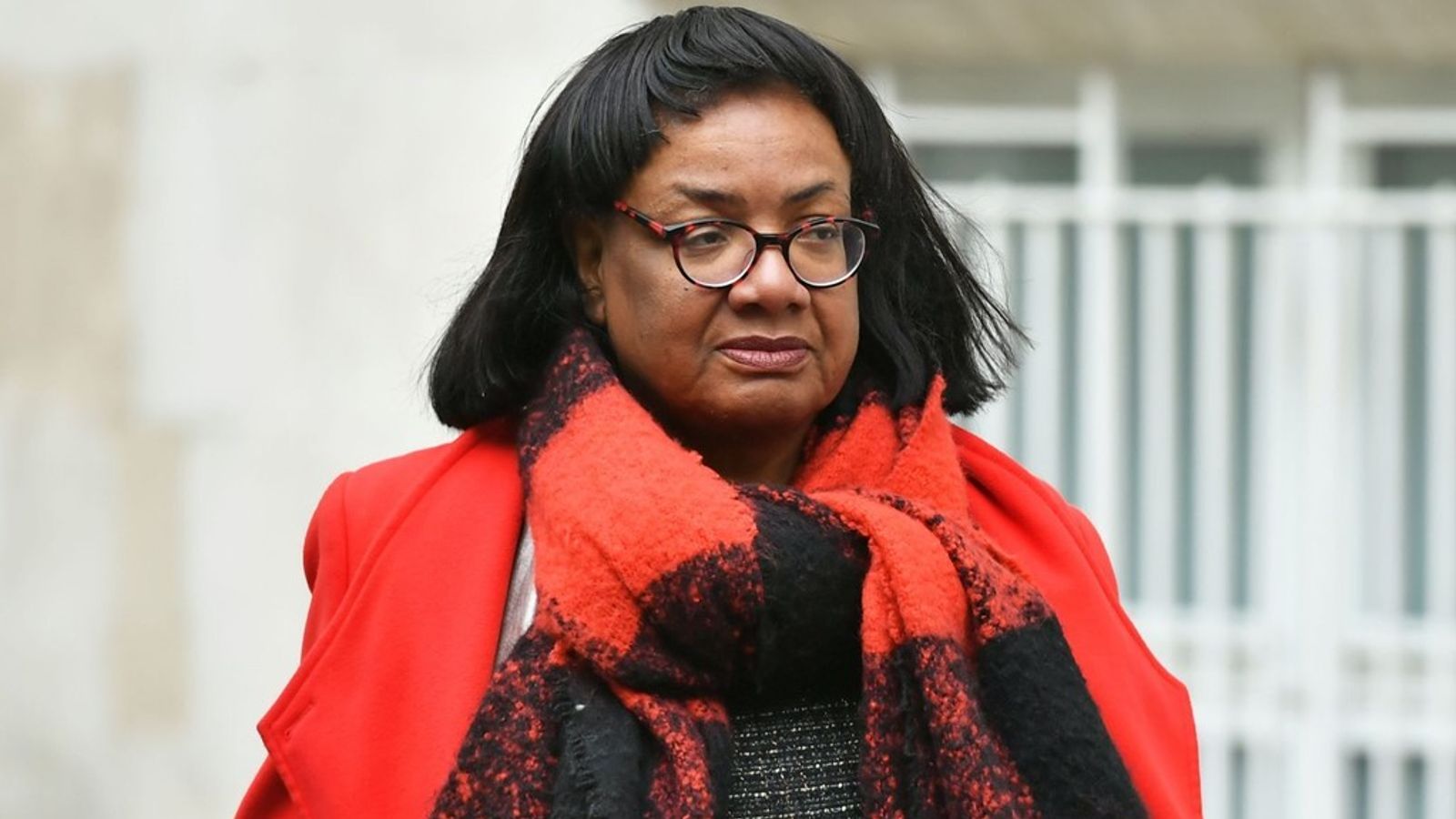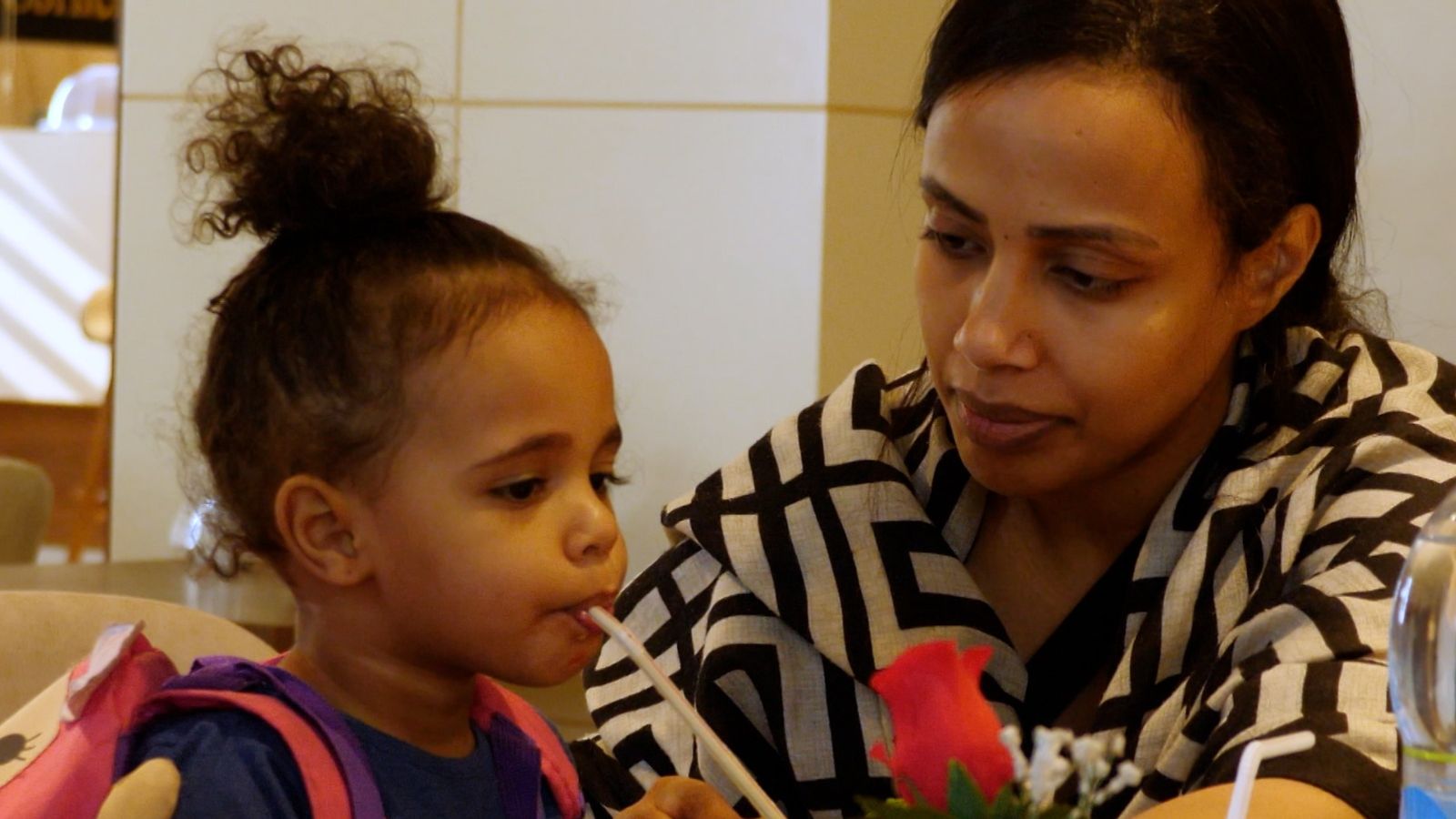Diane Abbott made history when she was elected as Britain’s first black female MP for Labour in 1987.
But after decades of speaking out on racism, her political career hangs in the balance due to widely condemned comments on the same issue.
The Hackney North and Stoke Newington MP has had the Labour whip suspended following a letter in The Observer in which she suggested Jewish people, Irish people and travellers do not face racism, but instead suffer prejudice like “redheads”.
Although she swiftly apologised and retracted the remarks, some want the former shadow home secretary to stand down and there are growing calls for Labour to expel her.
The row comes just weeks before May’s local elections and risks plunging the party into a fresh antisemitism row following years of accusations dogging Jeremy Corbyn’s leadership.
But it isn’t the first time the trailblazing politician has been a thorn in Labour’s side.
Here, Sky News looks at what we know about the veteran MP.
A career of firsts
Diane Abbott was born in London in 1953 to Jamaican immigrants. Her father worked as a welder and her mother was a nurse after moving to the UK as part of the Windrush generation.
When she was a child, no one in her family had gone to school past the age of 14.
But Ms Abbott was a star pupil at the Harrow County grammar school and went on to Newnham College in Cambridge, where she obtained a master’s degree in history.
Ms Abbott would go on to achieve many firsts in her career.
After graduating she briefly worked as a civil servant and then as a reporter before entering politics in her 30s – first on Westminster City Council in 1982 and then as an MP five years later.
She fought racism and opposition from within her own party to become the UK’s first black female MP for Hackney North and Stoke Newington in 1987 – a seat she has been returned to at nine elections since with big majorities.
A high-profile figure on the left of the party, Ms Abbott has spent most of her 36-year career making waves on the backbenches.
She is a vocal campaigner on race issues, human rights, and civil liberties.
In 2008 she famously opposed efforts to extend the amount of time that terror suspects could be detained without charge, making an award-winning speech in parliament that year which Tory MP David Davis praised as “one of the finest I have heard since being elected to the House of Commons”.
She has campaigned for gay rights, tougher action on climate change, reform of the Metropolitan Police and a fairer immigration system.
She has also spoken candidly about the abuse she has faced as a black female MP, telling Sky News this has involved being called “a b****, a n*****, rape threats, people saying I should be hanged”.
But while many regard her as a trailblazer and champion of justice, her outspoken remarks have often provoked the ire of MPs from within her own party.
Trouble on the backbenches
Under Tony Blair’s New Labour leadership, Ms Abbott voted consistently against the Iraq war, university tuition fees and renewing the UK’s Trident nuclear weapons system.
Her decision to educate her son privately caused a storm of criticism in 2003 because Ms Abbott had attacked her Labour colleague, Harriet Harman, for sending her son to a grammar school.
She described her decision as “indefensible” and “incoherent” but also said she feared her child would fall in with “black gangs” if he went to a state school.
After Labour’s loss at the 2010 election, Ms Abbott made an unsuccessful bid to become the next leader.
Ed Miliband, who was to win the contest, made her shadow minister for public health that year before sacking her in 2013.
Within hours of her dismissal, she spoke out against the party’s failure to offer “a more far-reaching criticism of austerity” and suggested it was “pandering to anti-immigrant sentiment”.
But Ms Abbott wasn’t off the frontbench for long.
In 2015, when close-ally and friend Jeremy Corbyn won the Labour leadership, she was elevated to his shadow cabinet.
Most notably she became shadow home secretary in 2016.
It was her most high-profile role yet, but not one without its controversies.
History of gaffes
Ahead of the 2017 general election, Ms Abbott stumbled through an explanation of her party’s plan for an additional 10,000 police officers in a famously excruciating interview on LBC.
Despite the policy being fully costed, she came up with incorrect figures of it costing £300,000 (£30 per bobby) and then £80m (£8,000 each).
The interview joined a list of gaffes Ms Abbott has developed a reputation for making.
She once argued China’s communist leader Chairman Mao did more “good than harm” during a debate over who was history’s worst dictator.
And in 2012 she sparked outrage among taxi drivers after posting a tweet which said: “Dubious of black people claiming they’ve never experienced racism. Ever tried hailing a taxi I always wonder?”
Perhaps her most well-known controversy was when she was forced to apologise after getting caught drinking an M&S can of mojito on the London Overground network in 2019.
Though on this occasion she also received supportive messages in reply to her apology, with one person writing: “I’ve never felt more represented.”
Post-Corbyn
After Labour’s crushing defeat in the 2019 election, Ms Abbott quit her position as a shadow cabinet member, saying she wanted to return to life on the backbenches and work on ensuring the party doesn’t take a “swerve to the right on migration policy”.
She has not shied away from criticising Sir Keir Starmer since he took the reins, questioning his position on strikes and the decision to ban Jeremy Corbyn from standing at the next election as a Labour MP.
Ms Abbott will now join her old friend as an independent until Labour decides otherwise, with Sir Keir saying earlier that her comments were “antisemitic” and an investigation is ongoing.
Please use Chrome browser for a more accessible video player
While some want her out of Labour, left-wing group Momentum said the whip should be restored after she apologised while veteran MP John McDonnell agreed – he said she made a “terrible mistake and knows it”.
What did Diane Abbott say?
In her letter to The Observer, Ms Abbott challenged claims from writer Tomiwa Owolade that “Irish, Jewish and Traveller people all suffer from ‘racism'”, instead claiming that they “undoubtedly experience prejudice”.
“It is true that many types of white people with points of difference, such as redheads, can experience this prejudice,” she said. “But they are not all their lives subject to racism.”
The former shadow home secretary added: “In pre-civil rights America, Irish people, Jewish people and Travellers were not required to sit at the back of the bus.
“In apartheid South Africa, these groups were allowed to vote. And at the height of slavery, there were no white-seeming people manacled on the slave ships.”
Beyond her apology on Sunday morning, in which she said the “errors arose in an initial draft being sent”, Ms Abbott has not yet commented on the Labour whip being removed, nor on calls for her to stand down at the next general election.
A day after she had the whip suspended, she continued with her criticism of the frontbench, attacking Shadow Health Secretary Wes Streeting’s plans to reform the NHS.
She also tweeted to mark the 30th anniversary of the murder of Stephen Lawrence, saying that: “Thirty years since the racist murder of Stephen Lawrence, and the Met police is no better now than it was then #racism.”








